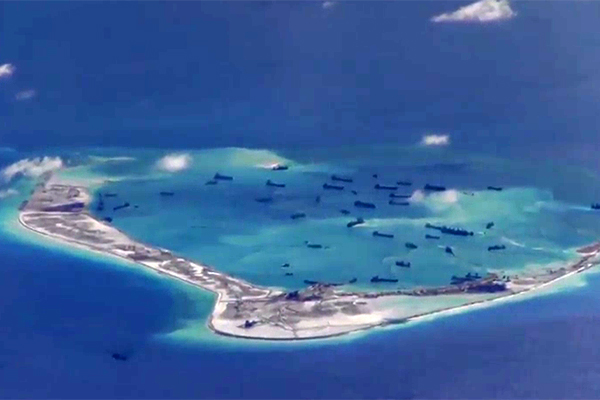
Screengrab from a surveillance video taken by the P-8A Poseidon showed China's reclamation activities in the West Philippine Sea. US Navy YouTube account
Malacañang on Sunday stressed the need to respect whatever decision will be made by the United Nations (UN) tribunal on the Philippines’s complaint against China following an assessment by an American think tank that Manila would likely get a favorable ruling on the case.
Presidential Communications Operations Secretary Herminio Coloma, Jr. said respecting the ruling would ensure freedom of navigation in the South China Sea, where more than $5 trillion worth of international trade passes through every year.
"At the recently concluded special ASEAN-US summit, President Aquino called upon all countries who believe in the rule of law and in peaceful dispute resolution to follow and abide by the decision of the UN arbitral tribunal on the PH petition,” Coloma said.
“Such call, if heeded, will serve to promote the primacy of freedom of navigation and overflight in the South China Sea/West Philippine Sea and in all international sea lanes as this is essential to the continuous flourishing of global trade and commerce," he added.
Earlier, the Asia Maritime Transparency Initiative (AMTI) said the UN arbitral tribunal would “almost certainly” rule that China’s expansive maritime claim in the South China Sea is not valid and that the country is “not entitled to any historic rights beyond the regime of territorial seas, exclusive economic zones, and continental shelves laid out in the United Nations Convention on the Law of the Sea.”
“This will not affect China’s territorial claims to the disputed islands and rocks of the South China Sea, nor will it necessarily mean that Beijing cannot make large claims to the seabed and waters in the area,” AMTI director Gregory Poling said in an article posted on the group’s website.
“But it will amount to an order that China clarify its maritime claims based on entitlements from land features, not ambiguous dashes on a map,” he added.
Poling said Beijing would not suddenly clarify its claims in the South China Sea because the tribunal orders it to do so.
“The Chinese government has repeatedly said that it will not recognize any ruling. But it has also worked hard since Manila brought the case in early 2013 to get the Philippine government to drop it. That is because being branded an international outlaw will involve significant reputational costs for Beijing,” he said.
“It will undermine China’s narrative that it is a responsible rising power that deserves a greater hand in global governance. It will make other countries wary of Chinese commitments and will drive regional states even closer to Tokyo and Washington,” he added.
Poling said a political compromise, which may involve entering into negotiations with the Philippines, might become appealing to China.
“In order to promote that kind of political compromise, Manila and Washington will need to embark on a sustained campaign to garner international support for the tribunal’s ruling. That support will need to come not only from like-minded countries like Australia, Japan, and European states, but also from the Philippines’ Southeast Asian neighbors,” the AMTI director added.
China claims about 90 percent of South China Sea while the Philippines, Malaysia, Brunei, Vietnam and Taiwan also have overlapping claims.
China said its claim is based on “historical rights,” a concept rejected by the Philippines and other countries who believe that territorial claims should be consistent with international law.
Unfazed by criticisms, China built what appear to be military structures on at least seven South China Sea reefs that are also being claimed by the Philippines.
In 2013, the Philippines challenged the legality of China’s territorial claim before the international arbitral tribunal, calling it “excessive” and “exaggerated.” China, however, refused to answer the complaint, saying it has “indisputable sovereignty” over the South China Sea.
Last October, the Philippines bagged a legal victory after an arbitration court in The Hague ruled that it has jurisdiction over the case it filed against China. The court said China’s refusal to participate in the proceedings does not deprive it of jurisdiction over the case.
With the issue of jurisdiction settled, the next hearings will focus on the merits of the Philippines’s case.
http://www.philstar.com/headlines/2016/02/28/1557754/govt-stresses-need-rule-law-peaceful-resolution-sea-disputes

No comments:
Post a Comment
Note: Only a member of this blog may post a comment.